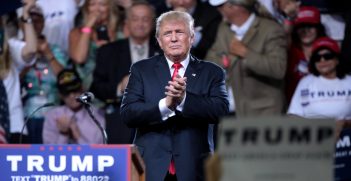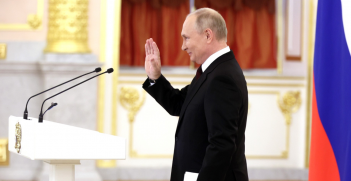Hungary's Viktor Orbán and the July “Peace Mission”

Hungary’s Viktor Orbán undertook a rogue “peace mission” in July to “resolve” the Russia-Ukraine conflict. His meetings with Vladimir Putin, China’s Xi Jinping, and Donald Trump achieved little except to repudiate the European Union’s own position.
Viktor Orbán went on a self-appointed mission beginning in early July to bring peace to Ukraine. Flying to Kyiv, Moscow, Beijing, and Palm Beach, Florida, Orbán met selectively with world leaders and potentially a soon-to-be re-elected Donald Trump. Why does this undermine the stance of the European Union (EU) and its solidarity with Ukraine?
Orbán is a rightwing populist and Eurosceptic prime minister who has been in power for 14 years. The European Parliament has denounced his government as a “hybrid regime of electoral autocracy,” noting further that the democratic legitimacy and human rights protections of Hungary’s people have eroded significantly. In return, Orbán has accused Brussels of being yet another “empire that has its eyes on Hungary.”
Hungary’s anti-refugee policies, its growing autocratic reach, and its relationship with Russia has caused Orbán to seek partnerships with other far-right governments in the EU to dampen pressure on protecting human rights and democracy. The Patriots for Europe alliance, for which Orbán is a key member, seek to gain power in the EU Parliament and dilute the legislation over issues of human rights, migration, and democracy. In the latest elections, it became the third largest group in the EU Parliament by number of members.
On 1 July this year, Hungary took on the position of president of the Council of the European Union, adding further challenges to Brussels united foreign policy goals, especially in the direction of the Ukraine conflict. Orbán’s “rogue” mission therefore carried the perception that his travels were authorised and representative. The EU had to make it clear that he was exclusively acting in his capacity as prime minister of Hungary and that the mission was unsanctioned. While Orbán accepts that the EU presidency does not give him a mandate to lead negotiations, Balázs Orbán—Viktor Orbán’s Political Director and member of the National Assembly—has nonetheless suggested that the six months of Hungary’s presidency be used to “create conditions for peace.”
In going against the wishes of Brussels, Orbán has shown a willingness to undermine the EU and its solidarity with Ukraine to increase his popularity in Hungary and gain respect or attention from other world leaders with similar authoritarian and right-wing leanings. But what is his plan for peace?
Orbán’s travels
On 2 July, Orbán travelled to Kyiv where he urged President Volodymyr Zelensky to “quickly consider the possibility of a ceasefire,” which “would make it possible to speed up the peace negotiations.” He expressed that he was visiting Kyiv because the war is important to the whole of Europe, and was “deeply impacting European security.” However, any next steps Orbán thought should be taken following a temporary ceasefire were unclear. Such a ceasefire also contradicts the position of Ukraine and the broader European community which calls on Russia to cease its war of aggression.
Orbán next travelled to Moscow, where he met with Putin, with whom he maintains close relations. Putin stated that he was ready to discuss the “nuances” of peace proposals to end the conflict, but repeated his demand for Ukraine to withdraw all its troops from annexed regions, and argued that Kyiv was “not ready to drop the idea of waging war until a victorious end.” It is unclear, although unlikely, if Orbán asked Putin if he would give up the annexed territories.
In Beijing, Orbán spoke with Xi Jinping. Xi called on other major powers to establish a “positive energy” environment conducive to creating a ceasefire between Ukraine and Russia. Orbán described China as a stabilising force and praised its “constructive and important” peace initiatives, such as the six-point peace plan. China’s plan calls for an international peace conference that includes “both Russia and Ukraine, with equal participation of all parties as well as fair discussion of all peace plans.” In the West, the plan has been criticised for blurring the line between the aggressor and the aggressed, and is not seen as genuine.
Orbán made his final stop Mar-a-Lago in Florida, where he met with former president Donald Trump, who Orbán presumably believes will be the next president of the United States. The pair discussed the “possibilities of peace”—the details of which have not been shared with the public—well before the November elections. While in the states, Orbán endorsed Trump’s re-election campaign at the expense of the sitting president Joe Biden.
On the 18 July, Orbán issued a 10-point letter to the heads of EU countries where he presented his findings. In sum, Putin and Zelensky are unlikely to “start searching for a way out of the conflict without significant external involvement.” Moreover, in a direct criticism of EU policies, he argued that the EU had “copied the pro-war policy of the US.” Orbán recommended a change in tact, including engaging in high-level talks with China, re-opening lines of communication with Russia, and gaining the support of the “Global South” in trying to resolve the conflict.
The backlash
EU officials and member states have been overwhelmingly critical of Orbán’s meetings. European Commission President Ursula von der Leyen warned that such appeasement would not stop Putin. Lithuanian President Gitanas Nauseda accused Orbán of undermining the EU presidency: “If you truly seek peace, you don’t shake hands with a bloody dictator, you put all your efforts to support Ukraine.” Meanwhile, EU Council President Charles Michel was quick to emphasise that the “EU rotating presidency has no mandate to engage with Russia on behalf of the EU.”
The European Commission has decided to boycott informal meetings hosted by Hungary as president of the EU Council. Liberal political groups in the EU Parliament, such as Renew Europe, are advocating for the termination of Hungary’s presidency, stating that Orbán undermined “the positions approved by the European Union and is acting against our interests, and this must be stopped.”
NATO Secretary-General Jens Stoltenberg has also declared that the alliance’s position on Ukraine will not change as a result of Orbán’s machinations.
In Ukraine, Zelensky poured further disdain on Orbán, stating that if “someone in Europe tries to resolve issues behind our backs […] and perhaps promise something against our common interests or at the expense of Ukraine or other countries – then why should we consider such a person?” He noted caustically that the “EU can also address all their issues without this one individual.”
In sum, Orbán’s rogue peace mission has, as of yet, failed to generate peace between Ukraine and Russia. While the EU is and should be concerned by Orbán’s actions, his behaviour is unlikely to cause the EU to rethink its support for Ukraine.
Abby Higgins is Head of Impact at Girls Run the World where she empowers young women in the diplomatic community, and is pursuing a Master of International Law and Diplomacy at the Australian National University. She is a former Australian Outlook Editor Intern of the Australian Outlook. She has also completed a Bachelor of Arts Dual Degree at the Paris Institute of Political Studies (Sciences Po) and the University of Sydney.
This article is published under a Creative Commons License and may be republished with attribution.






